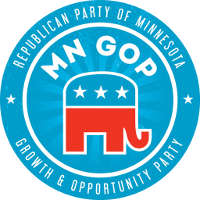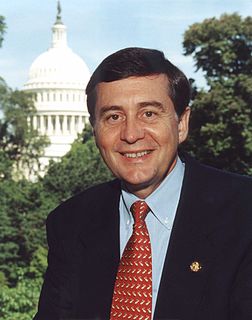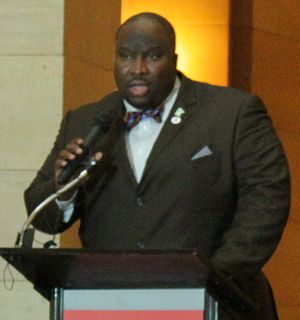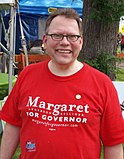
The Republican Party of Minnesota is a conservative political party in the U.S. state of Minnesota. It is affiliated with the United States Republican Party.

Gilbert William Gutknecht Jr. is an American politician. Gutknecht was a Republican member of the United States House of Representatives first elected in 1994 to represent Minnesota's 1st congressional district, one of eight congressional districts in Minnesota. Gutknecht lost his 2006 reelection bid to DFL candidate Tim Walz, and his term ended in January 2007.

The Minnesota Legislature is the bicameral legislature of the U.S. state of Minnesota consisting of two houses: the Senate and the House of Representatives. Senators are elected from 67 single-member districts. In order to account for decennial redistricting, members run for one two-year term and two four-year terms each decade. They are elected for four-year terms in years ending in 2 and 6, and for two-year terms in years ending in 0. Representatives are elected for two-year terms from 134 single-member districts formed by dividing the 67 senate districts in half.

The 2005 Minneapolis municipal elections in the U.S. state of Minnesota held a scheduled primary election on 13 September and a general election on 8 November. Voters in the city elected:

Minnesota's 5th congressional district election, 2006 was an election for the United States House of Representatives for the open seat of incumbent Martin Olav Sabo (DFL), who retired after serving the Minneapolis-based district for 28 years.

The 2008 Minnesota U.S. House of Representatives elections took place on November 4, 2008. All 8 congressional seats that make up the state's delegation were contested. Representatives were elected for two-year terms; those elected served in the 111th United States Congress from January 4, 2009 until January 3, 2011.

A general election was held in Minneapolis on November 3, 2009. Minneapolis's mayor was up for election as well as all the seats on the City Council, the two elected seats on the Board of Estimate and Taxation, and all the seats on the Park and Recreation Board. This was the first election held in Minneapolis that used ranked choice voting, a collective term for instant-runoff voting and the single transferable vote.

Jeffrey D. "Jeff" Hayden is a Minnesota politician and member of the Minnesota Senate. A member of the Minnesota Democratic–Farmer–Labor Party (DFL), he represents District 62, which includes portions of south Minneapolis in Hennepin County in the Twin Cities metropolitan area.

The 2013 Minneapolis mayoral election was held on November 5, 2013 to elect the Mayor of Minneapolis for a four-year term. This was the second mayoral election in the city's history to use instant-runoff voting, popularly known as ranked choice voting, first implemented in the city's 2009 elections. Municipal elections in Minnesota are nonpartisan, although candidates are able to identify with a political party on the ballot. After incumbent Mayor R. T. Rybak announced in late 2012 that he would not seek a fourth term, 35 candidates began campaigns to replace him. Many of these candidates sought the endorsement of the Minneapolis unit of the Minnesota Democratic–Farmer–Labor Party (DFL), though the convention ultimately ended with no endorsement.

The 2013 Minneapolis City Council elections were held on November 5, 2013 to elect the 13 members of the Minneapolis City Council for four-year terms. 10 races produced a winner in the first round and the remaining three in the second round. Candidates affiliated with the Minnesota Democratic–Farmer–Labor Party (DFL) won all 12 of the seats where they had fielded a candidate, and the Green Party of Minnesota won the remaining one seat.

A general election was held in Minneapolis on November 5, 2013. Minneapolis's mayor was up for election as well as all the seats on the City Council, the two elected seats on the Board of Estimate and Taxation, and all the seats on the Park and Recreation Board. Voters were able to rank up to three candidates for each office in order of preference.

The 2009 Minneapolis City Council elections were held on November 3, 2009 to elect the 13 members of the Minneapolis City Council for four-year terms. Candidates affiliated with the Minnesota Democratic–Farmer–Labor Party (DFL) won 12 seats and the Green Party of Minnesota one seat.

Peggy Flanagan is the 50th and current lieutenant governor of Minnesota. Her election on November 6, 2018, made her the second Native American woman to ever be elected to statewide executive office in U.S. history. She served as a member of the Minnesota House of Representatives from 2015 to 2019. A member of the Minnesota Democratic–Farmer–Labor Party (DFL), she represented District 46A in the western Twin Cities metropolitan area. A member of the White Earth Band of Ojibwe she joined fellow DFLer Susan Allen, and Republican Steve Green, an enrolled member of the White Earth Band of Ojibwe as the only other Natives in the Minnesota State House.
The 1980 Minnesota House of Representatives election was held in the U.S. state of Minnesota on November 4, 1980, to elect members to the House of Representatives of the 72nd Minnesota Legislature. A primary election was held on September 9, 1980.

A general election was held in the U.S. state of Minnesota on November 6, 2018. All of Minnesota's executive officers were up for election as well as all the seats in the Minnesota House of Representatives, several judicial seats, a United States Senate seat, Minnesota's eight seats in the United States House of Representatives, and several seats for local offices. Special elections were also be held for a Minnesota Senate seat and Minnesota's Class 2 U.S. Senate seat. A primary election to nominate Republican and Democratic–Farmer–Labor (DFL) candidates and several judicial and local primary elections were held on August 14, 2018.

The city of St. Paul, Minnesota held an election on November 7, 2017, to elect its next mayor, which was won by city councilman Melvin Carter III. Chris Coleman, who served as mayor from 2006, did not run for a fourth term and instead will run for Governor of Minnesota in 2018. This was the second mayoral election in St. Paul to use ranked-choice voting. Municipal elections in Minnesota are non-partisan, although candidates can identify with a political party.

A general election was held in Minneapolis on November 7, 2017. Minneapolis's mayor was up for election as well as all the seats on the City Council, the two elected seats on the Board of Estimate and Taxation, and all the seats on the Park and Recreation Board. Voters were able to rank up to three candidates for each office in order of preference.

The 2017 Minneapolis City Council election was held on November 7, 2017, to elect the members of the Minneapolis City Council. The political composition remained unchanged, with the Minnesota Democratic–Farmer–Labor Party (DFL) retaining 12 seats and the Green Party of Minnesota one seat. Three DFL incumbents were defeated by intraparty opponents. The new City Council convened on January 8, 2018.
















